 |
|
 |
|
| About Us | Essential
Library |
Homepage Archive | Resources | Composer Links |
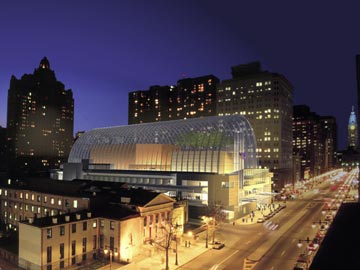 The new Kimmel Center for the Performing Arts is home to 2,500-seat Verizon
Hall, a cello-shaped concert hall with mahogany walls and state-of-the-art
acoustics designed especially for The Philadelphia Orchestra by Russell
Johnson, and a 650-seat Perelman Theater, with a stage that rotates to
accommodate chamber music, recitals and dance.
The new Kimmel Center for the Performing Arts is home to 2,500-seat Verizon
Hall, a cello-shaped concert hall with mahogany walls and state-of-the-art
acoustics designed especially for The Philadelphia Orchestra by Russell
Johnson, and a 650-seat Perelman Theater, with a stage that rotates to
accommodate chamber music, recitals and dance.

|
AMERICA'S GREATEST LIVING COMPOSER? Who is America's greatest living composer? Here's a vote for John Adams: "Adams is the most consistently serious of them all - eclipsing trend-setters such as Steve Reich and Philip Glass, edging out older types like Ned Rorem, and dwarfing the semi- tonal postmodernist brigade. An Adams premiere is an international event. Unlike Reich and Glass, he is still evolving. In contrast to retro-Puccinians like Mark Adamo and Jake Heggie, his best works withstand repeated hearing. He has enough ideas - and craftsmanship - to sustain interest from beginning to end: in short forms or long, his music inspires confidence. Most important of all, it remains pleasurable to the senses." Financial Times 01/11/02 SAME OLD TIRED IDEAS: The Toronto Symphony, having just (barely) staved off bankruptcy a few months ago, is trying to broaden its appeal by offering pops concerts. But "two fake palm trees, the billboard-sized words 'Club Swing,' two lounge tables and a dreary raconteur who reels off showbiz names just don't work on this stage in this venue. And asking the TSO to metamorphose into a red-hot swing orchestra is asking for a manned spaceflight to Mars this year. Playing the nostalgia card at this stage cannot be considered wise." Toronto Star 01/08/02 WRONG ABOUT WALTON? It's the 100th anniversary of composer William Walton's birth. There not being a lot of great English composers, Walton is regularly trotted out as one of the very best. "To suggest, as I am about to do, that Walton is not worth the candle of retrospection is to risk the wrath of friends and the scorn of patriots. Walton was a talented composer. He was also, in objective terms, an archetypal English failure whose shortcomings cry out for critical examination. When a king walks down Centenary Lane clad in nothing but local adulation, there must surely be one voice in the throng to draw attention to his immodesty." The Telegraph (UK) 01/09/02 HOW THEATRES GREW UP: A study of Venice's La Fenice Opera House gives some idea of the evolution of theatres adapting to social customs. "During the 18th century, the theater was one of the most important meeting places in public life. In the boxes and the camerini allocated to them - Marcel Proust described these as 'small living rooms minus their fourth walls' - people ate meals, made love and hatched intrigues before, during and after the performances." Frankfurter Allgemeine Zeitung 01/07/02 SAN DIEGO GIFT: The San Diego Symphony, which once went bankrupt and is perpetually in financial difficulty, is in line for a major gift - perhaps the largest-ever individual gift to an American symphony orchestra. "The money - thought by some in San Diego's arts community to be as much as $100 million - eventually could place the organization's endowment near the top 10 of U.S. orchestras and bring unprecedented stability to the 92-year-old institution." San Diego Union 01/09/02 IN PRAISE OF THE WALKOUT: Walking out of a performance is pretty rare these days. Some audience members walked out of a recent Dallas Opera performance of Wozzek. Usually, "audiences are more passive, or at least more polite, than they used to be. It's hard to play a piano concerto anymore and not get a standing ovation. 'I sometimes wish more people would walk out. At least it would show some passion'." Dallas Morning News 01/13/02 ART VERSUS INTERPRETATION: Is an opera production a "work of art?" "Missionaries for opera keep touting it as the greatest art form, simply because it supposedly subsumes so many others. Drama and music and painting, maybe even sculpture and dance: top that, if you can. Actually, the essence of opera, even for Richard Wagner, who dreamed of an 'artwork of the future' based on just this model, remained what it had been since Monteverdi: drama embedded in music. In a classic Platonic sense, this constitutes the work (in more fashionable parlance, 'the text'). On the other hand, a performance, along with its physical trappings, falls under the heading of interpretation, commonly held to be a creative function of the second order, though it does not have to be." The New York Times 01/13/02 FIRED CONDUCTOR STARTS RIVAL ORCHESTRA: Conductor Grzegorz Nowak was told this week that his contract as music director of the Edmonton Symphony wouldn't be renewed. The next day he announced he'd put together a group of supporters and will start a new orchestra in the city. The plans are ambitious: "an immediate 45 per cent increase in concerts, a growth in orchestra size from 56 players to 93, a near-doubling in musicians' salaries over six years, and annual recordings and/or tours beginning in 2002." The new orchestra "would be based on a quite different attitude," says Nowak. "The new orchestra would put musicians' concerns first and would present more concerts with higher-paid musicians." Edmonton Journal 01/10/02 BRITAIN'S TOP SINGERS: Who are Britain's top ten opera singers? A poll of English singers ranks Bryn Terfel on top. The Independent (UK) 01/07/02 THE
SELLING OF RENEE: Soprano Renee Fleming is said to have the most beautiful
voice on stage today. "Though singing may be a private orgy, it is also
a business, and if Fleming has become America's sweetheart it is because,
behind her soft smile, she so shrewdly understands the country's values:
the need to balance pleasure and profit, self-expression and the ambitious
manoeuvrings of a career." The Observer (UK) 01/06/02
|
Electronic Dialogues An Interview with Steven R. Gerber
Gerber has written for many of the major performers of our time. In addition to the concertos written for Nikkanen and Brey, he wrote his String Quartet #4 for the Fine Arts Quartet, his Viola Concerto for Yuri Bashmet, who premiered it at his festival in Tours, and several works for Russian violinist Tatyana Grindenko. His works have also been performed by such groups as the Knoxville Chamber Orchestra under Kirk Trevor, Philharmonia Virtuosi under Richard Kapp, and The Russian National Orchestra under Mikhail Pletnev. Most recently, he received a commission from Concertante Chamber Players for a work entitled "Spirituals" for clarinet and string quartet, premiered by them in 2001 in Harrisburg, New York City, and the Library of Congress in Washington, D.C.
Born in Washington, D.C. in 1948, Gerber now lives in New York City.
He has degrees from Haverford College and from Princeton University, which
awarded him a 4-year fellowship for graduate studies. His works have
been played throughout the U.S., Europe, and the former Soviet Union, where
he has toured frequently and had literally dozens of orchestral performances
and
S21: You are a remarkably prolific composer and have created works in a wide variety of forms—orchestral, chamber, choral, solo. Do you prefer one form over another? SRG:
For a long time I preferred to write solo, vocal, or chamber works
and didn't expect to write much for orchestra. When I began my Symphony
in 1988, at the age of 40, I had written only one previous work for orchestra,
some settings of Wallace Stevens for soprano and orchestra, which were
still unplayed. (I had to wait nearly 15 years for them to be performed;
oddly enough they were given two performances in Ukraine during the same
year with two different orchestras, singers, and conductors.) I Had
no idea when I would hear the Symphony, or my next work, a Serenade for
Strings, but I got
The Adams Chronicles
|
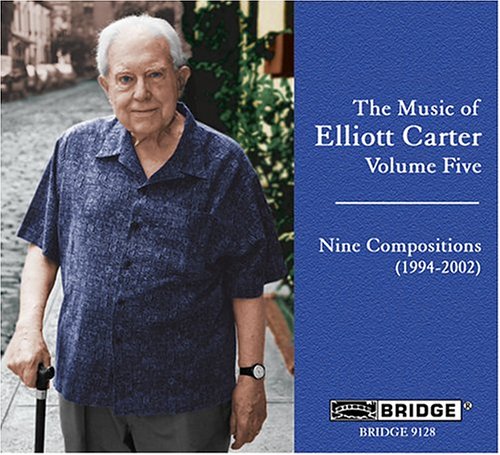
The Music of Elliott Carter, Volume Four Composer: E. Carter Conductor: Elliott Carter Performer: Susan Narucki, David Starobin, et al. Ensemble: Daniel Druckman Bridge - #9111 Volume four of Bridge's comprehensive Elliott Carter series includes the masterpiece, Eight Pieces for Four Timpani, as well as a number of short recent works. Particularly fine is David Starobin's performance of "Shard," a piece for solo guitar that is short but breathtakingly original. |
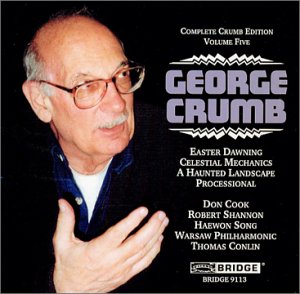
Complete Crumb Edition, Volume 5: Easter Dawning, Celestial Mechanics, A Haunted Landscape, Processional Composer: George Crumb Conductor: George Crumb Performer: Thomas Conlin Ensemble: Haewon Song , Robert Shannon Don Cook Bridge - #9113 The fifth release in Bridge's award winning Complete Crumb Edition includes the premiere recording of Crumb's1992 carillon solo, "Easter Dawning" played by Don Cook, carilloneur at Brigham Young University."Celestial Mechanics", for piano, four-hands is pure Crumb. "A Haunted Landscape" 1984) for orchestra is played by The Warsaw Philharmonic under conductor Thomas Conlin, the same combination that produced the Grammy-winning "Star-Child". |
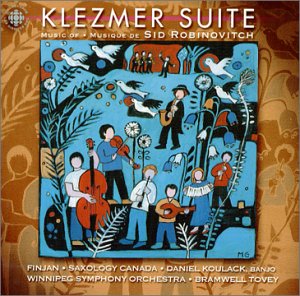
Klezmer Suite Composer: Sid Robinovitch Cbc Records --Naxos-- - #5212 |
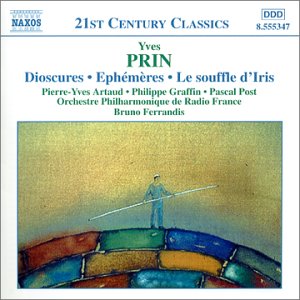
Dioscures, Ephemeres Composer: Yves Prin Conductor: Bruno Ferrandis Performer: Pierre-Yves Artaud Ensemble: Orchestre Philharmonique de Radio France Naxos - #8555347 Once you know that Prin was in Boulez's first composition class at IRCAM, the fact that all of these pieces are revisions of earlier pieces begin to make sense. Like the master, Prin is obviously a harsh critic of his own work. At 41 minutes, the disk covers a lot of contemporary territory and contains flashes of geninue originality. |
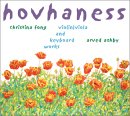
Violin|Viola and Keyboard Works Composer: Alan Hovhaness Performers: Christina Fong, Arved Ashby This disc might easily be subtitled "music to chill out by." Deceptively simple and meditative with just the right touches of exotic eastern mysticism, this is music that captivates through simplicity. A keeper. |
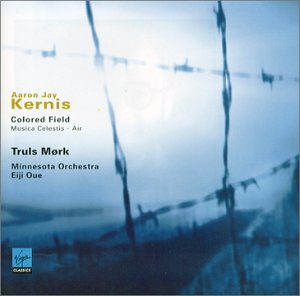
Colored Field · Musica Celestis · Air Composer: Aaron Jay Kernis Conductor: Eiji Oue Performer: Truls Mørk Emd/Virgin Classics - #45464 Some of Kernis' greatest hits retooled for Truls, who performs them magnificently.
|
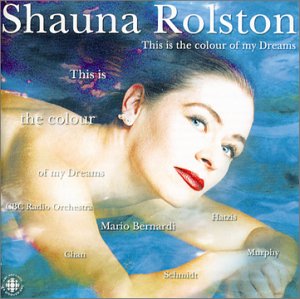
This Is the Colour of My Dreams Conductor: Mario Bernardi Performer: Shauna Rolston Ensemble: CBC Radio Orchestra Cbc Records --Naxos-- - #5214 Ralson is an enthusiastic advocate and performer of contemporary music. She has given the North American premiere of Gavin Bryar’s concerto, "Farewell to Philosophy", Rolf Wallin’s "Ground" for solo cello and strings, Krzysztof Penderecki’s Sextet for violin, viola, cello, piano, clarinet and horn, as well as the Canadian premiere of "Kai", a work for solo cello and 18 instruments by Mark Anthony Turnage. Here she delivers the world premieres of works written especially for her by Canadian composers Heather Schmidt, Christos Hatzis, Chan Ka Nin, and Kelly-Marie Murphy. |

Selected Songs Composer: Ned Rorem Performer: Ned Rorem, Carole Farley Naxos - #8559084 Pushing 80, Rorem continues to add to his extensive catalogue of over four hundred songs. His individual settings and cycles draw their texts from a wide range of poetry. Among his favorites sources have been Walt Whitman, Theodore Roethke, Kenneth Koch, Paul Goodman, and the English Metaphysical Poets. Nobody does art songs better. |
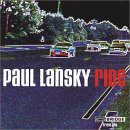
Ride Composer: Paul Lansky Bridge The title track, 'Ride', is a 19 minute piece made from sounds of a highway, processed and filtered to create sweeping sonic landscapes. An 8 channel version of the piece was played at Lincoln Center's 'Great Day in New York' festival in January 2000. |
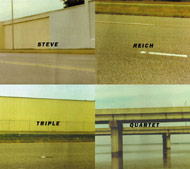
Triple Quartet/Music for a Large Ensemble/Electric Guitar Phase Steve Reich, Kronos Quartet, conductor Alan Pierson Wea/Atlantic/Nonesuch - #79546 This is the first recording of Reich’s Triple Quartet performed by Kronos Quartet, who commissioned the work and in whose honor it was written. This disc, the first to include a new work by Reich since the 1996 release City Life, also features first recordings of Electric Guitar Phase and Tokyo/Vermont Counterpoint, as well as the first recording of a newly revised edition of Music for Large Ensemble. |
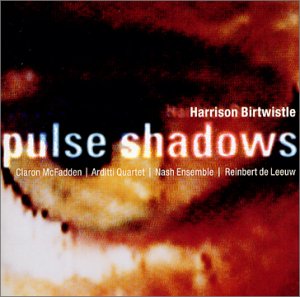
Pulse Shadows Composer: Harrison Birtwistle Wea/Atlantic/Teldec - #26867 Written for soprano, string quartet & ensemble of 2 clarinets, viola, cello and double bass, Pulse Shadows' nine string quartet movements alternate with the 'song' ensemble. The nine quartet movements comprise five Fantazias and four 'Friezes', of which the fourth is an instrumental meditation on Celan's famous poem Todesfuge (Death Fugue), with its strange recurrent image of black milk. |

Brahms · Stravinsky - Violin Concertos Composer: Johannes Brahms, Igor Stravinsky Performer: Neville Marriner Sony Classics - #89649 Thank heaven for little girls. Kid breathes new life into old workhorses. |
|
One-Minute Web Guide The essential guide to intelligent life on the internet |
Publisher: Duane Harper Grant (212) 582-4153 Editor: Jerry Bowles (212) 582-3791 Contributing Editors: Armando Bayolo, Sam Bergman, Joshua Cohen, Karina Cristina Demitrio, Deborah Kravetz (C) Sequenza/21 LLC 2000 |